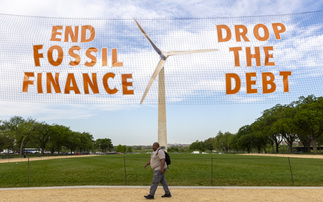The move to bring together many of the world's top investors in support of the net zero transition has quickly emerged as a 'gold standard' for how to drive climate action, but how did it come about and what will it do next?
The Net Zero Asset Owners Alliance - described recently by UN General Secretary António Guterres as the "gold standard" for net zero commitments - was born in New York in September 2019. It had been conceived in London earlier that year, when Günther Thallinger, member of the board of management at German investment giant Allianz and a passionate advocate for bolder climate action, walked into the headquarters of the Principles for Responsible Investment (PRI), his head buzzing with ideas.
"Günther came to my office saying Allianz was committed to setting net zero targets, and asking if we could help get more asset owners involved," recalls Fiona Reynolds, chief executive at PRI. "I thought this was a fantastic idea."
From there, PRI turned to its sister organisation, the United Nations Environment Programme's Finance Initiative (UNEP FI) for help reaching some of the world's most powerful companies. Together, they forged a plan to realise Thallinger's vision for a trailblazing initiative that would harness the heft of the world's biggest investors to the epochal task of decarbonising the world economy.
"We had the chance to talk with experts at the UN, who agreed it made sense to create a group of investors who were really committed to fighting climate change," says Thallinger, now chair of the Alliance's steering group. Allianz began talking with other investors, and unearthed a considerable shared desire to accelerate climate action: Caisse des Depots, Folksam Group, PensionDenmark, and Swiss Re were all quick to get on board. By September 2019, as a string of other financial giants including Alecta, AMF, CalPERs, and Zurich added their weight to the group, the Net Zero Asset Owners Alliance - now representing more than $2.4tr in assets - was ready for launch.
That moment, which took place at the 2019 Climate Action Summit in New York, marked a paradigm shift in the private sector's approach to climate change, argues Eric Usher, head of UNEP FI.
"The alliance resulted from a group of investors coming together to discuss how they could integrate the Paris Agreement across their portfolios," Usher recalls. "It showed it was no longer acceptable to talk about greening your finance offering, or scaling up support for renewable energy, while still being perfectly comfortable to finance fossil fuels and other non-green sectors. You had to take a holistic approach."
The result of this awakening was a new alliance with a radical set of goals that placed it far ahead of other initiatives in the same field. Since its launch, the Net Zero Asset Owners Alliance has quickly doubled in size and now unites 33 investors with assets totalling $5.4tr. Together, these investors have pledged to reach net zero emissions by 2050, not just for their operations but across their entire asset portfolios, and help others do the same by identifying decarbonisation pathways for strategically key, high-carbon sectors.
However, while such grand multi-decadal goals stand out, Usher argues the alliance's most important component is its commitment to smaller, near-term, measurable targets. "2050 can seem a long way off - many of us will be retired," he reflects. "Far more relevant than 2050 commitments is what you're doing much earlier than that."
Accordingly, Alliance members are currently pursuing targets not for 2050, but rather for 2025. These targets are rooted in the latest climate science, as detailed in the Alliance's "Inaugural 2025 Target Setting Protocol", published last month. This 80-page document draws on the Intergovernmental Panel on Climate Change's (IPCC's) 1.5C scenarios, which lay out what must happen by 2040, by 2030, and by 2025 if global heating is to be kept to around 1.5C - generally seen as a cut-off point for some of the most severe impacts of climate breakdown, beyond which fierce heatwaves, rising seas, and ecosystem collapse are likely to accelerate across the planet, bringing with them potentially catastrophic economic and humanitarian impacts.
Based on the IPCC's analysis, the protocol defines a 2025 emissions reduction target of between 16 and 29 per cent, based on a 2019 baseline. Individual alliance members pledge to reduce emissions across their portfolios within that range, with those further along the low-carbon road adopting higher targets, and those with more distance left to travel setting lower ones.
Members will then report annually on their progress towards the targets, with a full quantitative assessment scheduled for 2025, at which point new, more ambitious targets will be set for 2030. This programme aligns the alliance with Article 4.9 of the Paris Agreement, which requires governments to submit updated emissions reduction plans every five years. "No other group has 2025 targets or a commitment for a ratchet every five years in line with the Paris Agreement," argues Fiona Reynolds. "It's very cutting-edge."
Of course, establishing emission reduction targets is only the start of the alliance's work. The next task is to achieve them - a serious challenge, particularly as the protocol steers members away from simply divesting high-carbon assets, warning that offloading high carbon assets to others "limits the opportunity to impact positively on company behaviours" and "does not lead to measurable outcomes in the real economy."
Instead, the protocol outlines a three-pronged strategy for achieving "real world impact". Firstly, it urges alliance members to engage with high-carbon companies on their decarbonisation pathways. Secondly, it advocates backing efforts to reduce the overall emissions intensity of high priority hard-to-decarbonise sectors. And thirdly, it calls on investors to ramp up financing for climate-positive investments such as renewables, green buildings, sustainable finance, and green hydrogen. In each of these areas, alliance members are advised to set targets and report back on progress.
For the UN's Eric Usher, the most important of these tactics is engagement. "Divesting from coal and investing in renewables is easy - the hard stuff is everything in between," he argues. "So yes we are going to need new Teslas, new start-ups with totally different business models. But the bulk of the work is how we change existing companies, and that is mostly through engaging owners and working with them to shift towards low-carbon business models."
However, there are encouraging signs that there is an appetite for this "hard stuff". The widespread embrace of environmental, social, and corporate governance (ESG) criteria across the private sector means most companies are now very open to discussing how to improve their long-term sustainability, Günther Thallinger says.
"We get a good response from companies - they're more than willing to work with us on their sustainability approach, to discuss a long-term vision that will see us continue to be their financial partner," he reveals, adding that companies are particularly responsive to a united approach like that of the alliance. The co-ordinated approach from multipleleading asset owners is welcomed by businesses, he notes, as without it a firm with many partners and financial backers could end up with an exhausting workload if each is separately demanding engagement on their sustainability goals.
However, while such openness is welcome some campaigners worry the Alliance's focus on engagement could prove too gentle to trigger the transformative changes necessary to decarbonise business models at the rapid pace required by the Paris Agreement.
"I struggle with the notion that engagement is this magic tool and that divestment is something that isn't scientifically proven to work," says Wolfgang Kuhn, director of financial sector strategies at ShareAction. "In my experience, if a lot of people flag an issue and sell shares and the stock price falls, then management can't care enough about it."
Rather than simply talking with companies, Kuhn suggests laying down targets and expectations while making it clear that, if they are not acted on by the next AGM, the management risks being voted out. "We are on board with engagement but it needs to be more forceful: ultimately equity holders are the owners of the companies," he says. "You have to use your votes as actively as you can and anyone not using their votes - that's just unacceptable, that's not stewardship."
But many alliance members are increasingly in agreement with Kuhn that more aggressive action may be necessary with those firms that fail to come forward with credible decarbonisation plans. "If companies aren't following any plans we set out, then ultimately we can either divest or vote against management - they're two important options to have," acknowledges Morten Nilsson, CEO of the BT Pension Scheme (BTPS). But here too, being part of the alliance can strengthen an investor's hand. "Sometimes our shareholding might not be big enough to have the influence we might like," Nilsson notes. "Then it is really helpful to be together with others, either via our asset managers or the alliance."
While engaging individual portfolio companies is central to its remit, the alliance also aims to use its influence more broadly to support high-carbon sectors on their decarbonisation journey. The protocol calls on alliance members to help design "sectoral decarbonisation pathways" in those critical areas where decarbonisation efforts could make or break the net zero transition: utilities, aviation, shipping, heavy duty road transport, and energy-intensive industries such as steel and chemicals.
One key way to develop such pathways is via research. By pooling its financial resources, the alliance can commission studies on viable transition pathways for different industries, drawing on the type of expertise "they might not be able to individually", Usher says. Last year, for example, the alliance funded the team behind the trailblazing One Earth Climate Model (OECM) to produce a 100-page document outlining decarbonisation pathways for several key industries. "Together we can work with the scientific community to identify who in a particular industry has the best decarbonisation models," Usher says. "We can support research into identifying a pathway to decarbonise cement, for example, and members can use that research to engage with cement companies in their portfolios, and to benchmark them."
Linked to efforts to decarbonise key sectors is another of the alliance's core functions: "financing the transition" via "climate-positive investments". The 2025 protocol specifies a number of focal points for such investments, including "renewable energy in emerging markets, green buildings, sustainable forests, and green hydrogen". But the scope for action is vast - and thrilling.
"Our asset managers are constantly looking for new technologies and we have a number of large investments in these areas," says Nilsson, giving the examples of the Fallago Rig wind farm in Scotland and cutting-edge sustainable real estate projects across Manchester, Leeds, and King's Cross.
While bringing such individual investments into an investor's portfolio can help it move towards its climate targets, some of the biggest prizes in terms of financing the transition lie in funding the development of potentially transformative technologies. This involves a bit of a gamble, as the viability and importance of many net zero technologies - such as green hydrogen, or the diverse incarnations of carbon capture and storage - is not yet clear. But, again, the collective clout of a group of some of the world's richest financial institutions provides an opportunity to both mobilise patient capital and spread risks in a way that can accelerate the expansion of early stage industries.
One option in this context is blended finance, for example, where investors back projects together with development banks and philanthropic funds, sharing risks in a way that can help innovative projects access the finance they need. It is an approach Allianz expects to be play an important role in its efforts to finance the transition, according to Thallinger. "There are assets that are very low carbon, perhaps even negative carbon, and there are assets that could help entire businesses, sectors, geographical regions to transition," he says. "Here blended finance is one of the big areas, because we need to mitigate risk."
This web of interlinked strategies - setting portfolio targets, engaging with high-carbon companies, sketching out sector decarbonisation pathways, and financing the transition - lie at the core of the alliance's work to spearhead the decarbonisation of the global economy. And there is an impact that can be had beyond this core work, of course. Nilsson points to the alliance's potential for "global policy engagement" around issues like reporting requirements and support for climate friendly infrastructure; Reynolds highlights one-off advocacy efforts like the alliance's recent call to cease financing thermal coal. When big money talks, political and business leaders tend to listen.
As such the low-carbon wheels are very much in motion, and Reynolds predicts a surge of new signatories to the group through 2021 in the run up to the COP26 Climate Summit in Glasgow in November. "There are always some people out in front and others who take a little longer, who prefer to sit back and see how it's going," she says. "We'll see many more people joining the alliance over the next 12 to 24 months."
Those that do, Thallinger says, are taking on a significant task: the fundamental rewiring of global capitalism. "There is no doubt capitalism as it is cannot be continued," he concludes. "We who are players in these markets must prove that it can become sustainable."
Want to find out more about Net Zero Finance and the investment trends impacting businesses and investors of all types? Then join us at the Net Zero Finance pathway event, as part of the Net Zero Festival 2021, which will take place online on March 16th. You can request an invitation to the event here.








